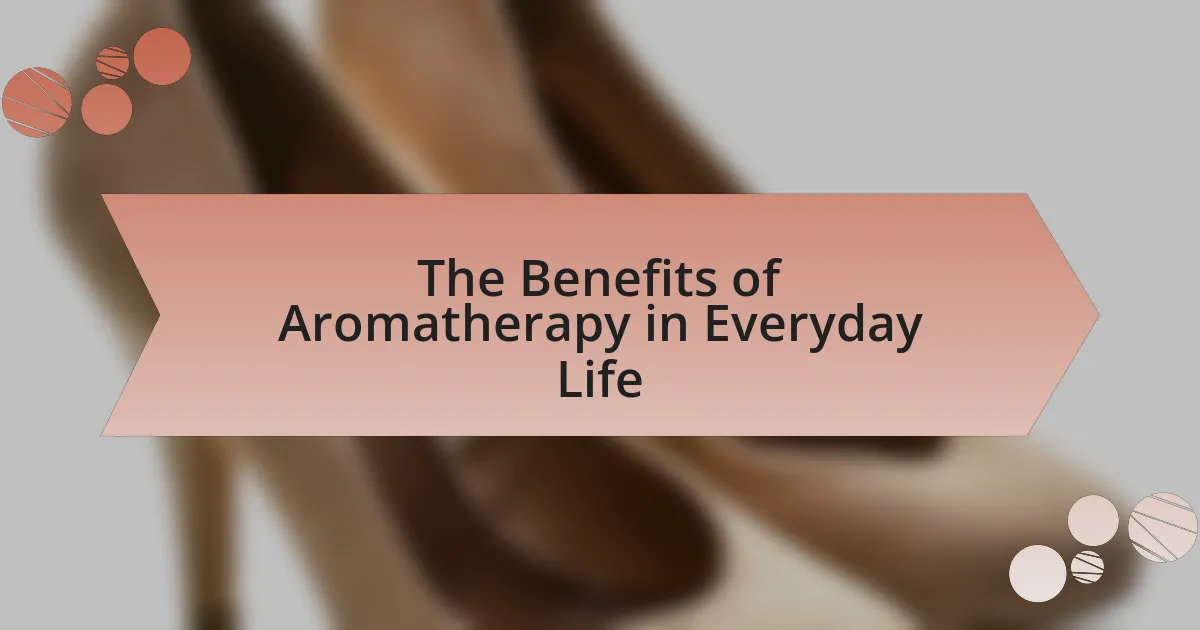Aromatherapy is a holistic healing practice that employs essential oils derived from plants to enhance physical and emotional well-being. This article explores the various essential oils used in aromatherapy, their extraction methods, and their therapeutic properties. It highlights how aromatherapy can positively impact mental health by reducing anxiety and improving mood, as well as its physical health benefits, including pain relief and enhanced sleep quality. Additionally, the article discusses practical applications of aromatherapy in daily life, workplace settings, and wellness industries, while emphasizing safety guidelines for using essential oils effectively.

What is Aromatherapy and How Does it Work?
Aromatherapy is a holistic healing practice that utilizes essential oils extracted from plants to promote physical and emotional well-being. It works by inhaling the aromatic compounds or applying them topically, which can stimulate the brain’s limbic system, influencing mood and health. Research indicates that certain essential oils, such as lavender and peppermint, can reduce anxiety and improve sleep quality, demonstrating the therapeutic effects of aromatherapy on mental health.
What are the essential oils used in aromatherapy?
The essential oils used in aromatherapy include lavender, eucalyptus, peppermint, tea tree, lemon, and chamomile. Lavender oil is known for its calming properties, making it effective for stress relief and sleep enhancement. Eucalyptus oil is often used for respiratory issues due to its decongestant effects. Peppermint oil can aid in digestion and provide an invigorating sensation. Tea tree oil is recognized for its antibacterial and antifungal properties, while lemon oil is valued for its uplifting and refreshing scent. Chamomile oil is commonly used for its soothing effects, particularly in promoting relaxation and reducing anxiety. These oils are widely utilized in various aromatherapy practices to enhance physical and emotional well-being.
How are essential oils extracted for use in aromatherapy?
Essential oils are extracted for use in aromatherapy primarily through methods such as steam distillation, cold pressing, and solvent extraction. Steam distillation involves passing steam through plant material, which vaporizes the volatile compounds; the steam is then cooled, condensing back into liquid form, separating the essential oil from the water. Cold pressing is commonly used for citrus oils, where the peels are mechanically pressed to release the oils. Solvent extraction uses chemical solvents to dissolve the essential oils from plant material, which are then separated from the solvent. These methods ensure the preservation of the aromatic and therapeutic properties of the oils, making them suitable for aromatherapy applications.
What properties do different essential oils possess?
Different essential oils possess a variety of properties that can influence physical and emotional well-being. For example, lavender oil is known for its calming and relaxing effects, often used to reduce anxiety and improve sleep quality. Tea tree oil has antiseptic and antimicrobial properties, making it effective for treating skin infections and promoting healing. Peppermint oil is recognized for its invigorating scent and ability to relieve headaches and improve focus. Eucalyptus oil is valued for its respiratory benefits, helping to clear congestion and ease breathing. These properties are supported by various studies, such as the research published in the Journal of Alternative and Complementary Medicine, which highlights the therapeutic effects of essential oils on stress reduction and overall health.
How does aromatherapy affect the mind and body?
Aromatherapy positively affects the mind and body by utilizing essential oils to promote psychological and physical well-being. The inhalation of these oils can stimulate brain function, leading to reduced anxiety, improved mood, and enhanced cognitive performance. For instance, a study published in the Journal of Alternative and Complementary Medicine found that lavender essential oil significantly reduced anxiety levels in participants, demonstrating its calming effects. Additionally, aromatherapy can alleviate physical symptoms such as pain and inflammation; research in the Journal of Pain and Symptom Management indicated that essential oils like peppermint and eucalyptus can effectively reduce headaches and muscle tension. Thus, aromatherapy serves as a holistic approach to enhancing mental clarity and physical comfort.
What are the psychological effects of aromatherapy?
Aromatherapy has significant psychological effects, primarily promoting relaxation, reducing anxiety, and enhancing mood. Research indicates that essential oils, such as lavender and bergamot, can lower stress levels and improve emotional well-being. A study published in the Journal of Alternative and Complementary Medicine found that inhaling lavender essential oil significantly reduced anxiety levels in participants. Additionally, aromatherapy has been shown to improve sleep quality, which further contributes to better mental health outcomes. Overall, the psychological benefits of aromatherapy are supported by empirical evidence demonstrating its effectiveness in enhancing emotional states and reducing psychological distress.
How does aromatherapy influence physical health?
Aromatherapy influences physical health by utilizing essential oils to promote healing and well-being. Research indicates that certain essential oils can reduce pain, alleviate symptoms of respiratory conditions, and enhance overall physical health. For example, a study published in the Journal of Alternative and Complementary Medicine found that inhalation of lavender essential oil significantly reduced pain levels in patients undergoing surgery. Additionally, eucalyptus oil has been shown to improve respiratory function, making it beneficial for individuals with asthma or bronchitis. These effects demonstrate that aromatherapy can serve as a complementary approach to traditional medical treatments, enhancing physical health through natural means.

What are the Key Benefits of Aromatherapy in Everyday Life?
Aromatherapy offers several key benefits in everyday life, including stress reduction, improved mood, enhanced sleep quality, and relief from physical ailments. Stress reduction is achieved through the calming effects of essential oils like lavender, which studies have shown can lower cortisol levels, a hormone associated with stress. Improved mood is facilitated by oils such as citrus, which can elevate serotonin levels, contributing to feelings of happiness. Enhanced sleep quality is supported by oils like chamomile, known for their sedative properties, which can lead to better sleep patterns. Additionally, aromatherapy can provide relief from physical ailments, as certain oils like peppermint have been found to alleviate headaches and digestive issues. These benefits are supported by various studies, including research published in the Journal of Alternative and Complementary Medicine, which highlights the efficacy of aromatherapy in promoting overall well-being.
How can aromatherapy improve mental well-being?
Aromatherapy can improve mental well-being by utilizing essential oils to enhance mood and reduce stress. Research indicates that specific scents, such as lavender and bergamot, can lower anxiety levels and promote relaxation. A study published in the Journal of Alternative and Complementary Medicine found that inhaling lavender essential oil significantly reduced anxiety in participants, demonstrating its effectiveness in mental health support. Additionally, aromatherapy can stimulate the limbic system, which is responsible for emotions, thereby influencing feelings of calmness and happiness.
What role does aromatherapy play in stress relief?
Aromatherapy plays a significant role in stress relief by utilizing essential oils to promote relaxation and reduce anxiety. Research indicates that inhaling certain essential oils, such as lavender and chamomile, can lower cortisol levels, a hormone associated with stress. A study published in the Journal of Alternative and Complementary Medicine found that participants who engaged in aromatherapy experienced a notable decrease in stress and anxiety levels compared to those who did not. This evidence supports the effectiveness of aromatherapy as a complementary approach to managing stress in everyday life.
How can aromatherapy enhance mood and emotional balance?
Aromatherapy can enhance mood and emotional balance by utilizing essential oils that influence the brain’s limbic system, which is responsible for emotions. Specific oils, such as lavender and bergamot, have been shown to reduce anxiety and improve mood. For instance, a study published in the Journal of Alternative and Complementary Medicine found that inhaling lavender essential oil significantly decreased anxiety levels in participants. Additionally, research from the International Journal of Neuroscience indicated that bergamot oil can elevate mood and reduce stress by promoting the release of serotonin. These findings demonstrate that aromatherapy effectively supports emotional well-being through the biochemical effects of essential oils on the brain.
What physical health benefits does aromatherapy provide?
Aromatherapy provides several physical health benefits, including pain relief, improved sleep quality, and enhanced immune function. Essential oils such as lavender and eucalyptus have been shown to alleviate headaches and muscle pain, with studies indicating that inhalation of these oils can reduce perceived pain levels. Additionally, research published in the Journal of Alternative and Complementary Medicine found that aromatherapy can significantly improve sleep quality in individuals suffering from insomnia, leading to better overall health. Furthermore, certain essential oils possess antimicrobial properties, which can support immune health by helping to fend off infections.
How can aromatherapy assist with pain management?
Aromatherapy can assist with pain management by utilizing essential oils that have analgesic and anti-inflammatory properties. For instance, oils such as lavender and peppermint have been shown to reduce pain perception and promote relaxation. Research published in the Journal of Pain Research indicates that inhalation of lavender oil significantly decreased pain levels in patients with chronic pain conditions. Additionally, a study in the Journal of Alternative and Complementary Medicine found that peppermint oil applied topically provided relief from tension headaches. These findings support the effectiveness of aromatherapy as a complementary approach to pain management.
What are the benefits of aromatherapy for sleep quality?
Aromatherapy significantly enhances sleep quality by promoting relaxation and reducing anxiety. Essential oils such as lavender and chamomile have been shown to lower heart rate and blood pressure, creating a calming effect conducive to sleep. Research published in the Journal of Alternative and Complementary Medicine found that inhaling lavender essential oil improved sleep quality in participants, leading to longer sleep duration and reduced insomnia symptoms. Additionally, aromatherapy can help regulate circadian rhythms, further supporting restful sleep.

How Can Aromatherapy Be Integrated into Daily Routines?
Aromatherapy can be integrated into daily routines by incorporating essential oils into various activities such as bathing, meditation, and cleaning. For instance, adding a few drops of lavender oil to a warm bath can promote relaxation, while diffusing citrus oils during work can enhance focus and energy. Studies have shown that inhaling essential oils can influence mood and cognitive performance, supporting their use in daily life. Additionally, using essential oils in household cleaning products can provide both a pleasant scent and antimicrobial properties, making chores more enjoyable and effective.
What are practical ways to use aromatherapy at home?
Practical ways to use aromatherapy at home include using essential oil diffusers, applying oils topically, and incorporating them into baths. Essential oil diffusers disperse aromatic compounds into the air, creating a pleasant environment and promoting relaxation; studies show that inhaling certain essential oils can reduce stress and anxiety levels. Applying diluted essential oils directly to the skin can provide localized benefits, such as relief from headaches or muscle tension; for example, peppermint oil is known for its analgesic properties. Additionally, adding essential oils like lavender or eucalyptus to bathwater can enhance relaxation and improve sleep quality, as evidenced by research indicating that aromatherapy can positively affect sleep patterns.
How can essential oils be diffused effectively?
Essential oils can be diffused effectively by using a diffuser, which disperses the oils into the air as a fine mist. Diffusers, such as ultrasonic or nebulizing types, utilize water or air pressure to break down the oils, allowing for optimal scent distribution and therapeutic benefits. Research indicates that diffusing essential oils can enhance mood and reduce stress, with studies showing that lavender oil, for example, can lower anxiety levels when diffused in a room.
What are some DIY recipes for aromatherapy blends?
Some DIY recipes for aromatherapy blends include combining essential oils with carrier oils for various effects. For relaxation, mix 5 drops of lavender oil with 2 tablespoons of sweet almond oil. For energy, blend 3 drops of peppermint oil and 3 drops of lemon oil with 2 tablespoons of jojoba oil. To promote focus, combine 4 drops of rosemary oil and 2 drops of eucalyptus oil with 2 tablespoons of grapeseed oil. These blends utilize the therapeutic properties of essential oils, which have been shown to influence mood and well-being, as supported by studies on aromatherapy’s effects on stress reduction and cognitive function.
How can aromatherapy be utilized in professional settings?
Aromatherapy can be utilized in professional settings to enhance employee well-being and productivity. By incorporating essential oils into the workplace, organizations can create a calming atmosphere that reduces stress and anxiety, leading to improved focus and morale. Research indicates that scents like lavender and peppermint can positively affect mood and cognitive performance, with studies showing that lavender can reduce anxiety levels by up to 20% and peppermint can enhance alertness and memory retention. Implementing aromatherapy through diffusers, personal inhalers, or scented candles can provide a simple yet effective way to foster a healthier work environment.
What are the benefits of aromatherapy in the workplace?
Aromatherapy in the workplace enhances employee well-being and productivity. The use of essential oils, such as lavender and peppermint, has been shown to reduce stress, improve mood, and increase focus. Research indicates that environments infused with pleasant scents can lead to a 20% increase in productivity and a significant reduction in anxiety levels among employees. For instance, a study published in the Journal of Alternative and Complementary Medicine found that aromatherapy can lower stress hormones and promote relaxation, contributing to a more positive work atmosphere.
How can aromatherapy enhance client experiences in wellness industries?
Aromatherapy can enhance client experiences in wellness industries by promoting relaxation, reducing stress, and improving overall well-being through the use of essential oils. Research indicates that specific scents, such as lavender and chamomile, can lower cortisol levels, which are associated with stress, thereby creating a calming environment for clients. Additionally, studies have shown that aromatherapy can improve mood and cognitive function, leading to a more positive experience during wellness treatments. For instance, a study published in the Journal of Alternative and Complementary Medicine found that participants exposed to essential oils reported significantly lower anxiety levels compared to those who were not. This evidence supports the effectiveness of aromatherapy in enhancing client satisfaction and outcomes in wellness settings.
What are some best practices for using aromatherapy safely?
To use aromatherapy safely, it is essential to dilute essential oils before application, as undiluted oils can cause skin irritation or allergic reactions. The recommended dilution is typically 1-5% for topical use, depending on the oil and individual sensitivity. Additionally, individuals should perform a patch test on a small skin area to check for adverse reactions before widespread use. It is also crucial to avoid ingestion of essential oils unless under the guidance of a qualified healthcare professional, as many oils can be toxic when consumed. Pregnant or nursing women, children, and individuals with specific health conditions should consult a healthcare provider before using aromatherapy. Furthermore, using high-quality, pure essential oils from reputable sources ensures safety and efficacy, as adulterated oils may pose health risks.
How can one avoid potential allergic reactions to essential oils?
To avoid potential allergic reactions to essential oils, one should conduct a patch test before full application. This involves applying a diluted drop of the essential oil to a small area of skin and observing for any adverse reactions over 24 hours. Research indicates that allergic reactions can occur in up to 10% of individuals using essential oils, highlighting the importance of this precaution. Additionally, using high-quality, pure essential oils and consulting with a healthcare professional can further minimize risks.
What guidelines should be followed for essential oil dilution?
Essential oil dilution guidelines include using a carrier oil to reduce the concentration of essential oils for safe application on the skin. A common dilution ratio is 2-3 drops of essential oil per teaspoon of carrier oil for topical use, which is generally safe for adults. For children, a more conservative dilution of 1 drop per teaspoon is recommended. These guidelines are supported by the National Association for Holistic Aromatherapy, which emphasizes the importance of dilution to prevent skin irritation and sensitization.
